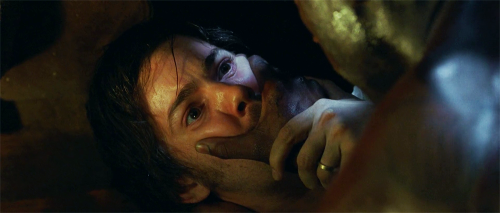So you’re you, yes? A person of conservative or traditional or simply unloony views walking your campus with your head in...
Cloud Atlas: A Mixed Bag Worth Exploring
One of my favorite films I’ve seen in the last year was Cloud Atlas, the latest directorial effort by the siblings who brought us The Matrix. It’s an ambitious film, clocking in at almost three full hours, following five main story lines across space and time to explore grandiose themes of interconnectedness, moral duty, and the value of convention. It gives some wrong answers to some very important questions, but its high points of insight and aesthetically brilliant narratives make it worth watching.
The most overtly stated message of the film is articulated by one character this way: “Our lives are not our own. From womb to tomb, we are bound to others. Past and present. And by each crime and every kindness, we birth our future.” Cloud Atlas follows five unconnected narratives, though all lead actors appear as a different characters in each plot line. The reuse of actors, recast as allusions to another story and identity, forces each character to confront their dependence on people in their lives. It asks characters to acknowledge and honor their debt to those who came before them, their contemporaries, and those who will come later. Each relationship in the film is one of need and giving, of connection with the past, present, and future. In this way, Cloud Atlas is a Burkean film.
The theme of interdependence leads to a particularly poignant discussion of moral duty. One of the characters encounters a runaway slave hiding in his cabin during a voyage from Africa back to England. When the Englishman, Adam Ewing, threatens to report the stowaway to the captain, the slave, Autua, begs for acceptance onto the crew as an honest sailor. Mr. Ewing attempts to evade the situation despite Autua’s claims that the captain will surely cast him overboard without the support of a legitimate passenger.
Adam Ewing: I…I can’t help you. I’m afraid your fate is entirely your own. I desire no part in it.
Autua: Then kill I.
[Autua takes out his knife and takes hold of Adam’s hand]
Adam Ewing: Don’t be absurd!
Autua: If you won’t help, you kill I, just the same. It’s true. You know it. I ain’t be no fish food, Mr. Ewing. Die here better. Do it.
This way of looking at morals is terrifying to self-involved modern man; could it be that we have moral responsibilities to which we did not consciously consent? Such a scene is a powerful objection to the postmodern ethics shared by most young people that begins and ends with consent.
The film goes wrong, however, in the disdain for convention. It often demonizes those who claim an outside standard of morality or natural order. Such characters are embodied as a white supremacists writing philosophical defenses of the slave trade or a pompous, washed-up composer poaching the ideas of his assistant and protege under the threat of blackmail. Without the proper veneration of tradition, fulfilling our moral obligations to one another becomes increasingly difficult. Our morality is inherited by virtue of a civilization built by our ancestors. To dismiss our ancestors is to dismiss our civilization and our morality. Of course, we venerate the virtue our our ancestors while not endorsing the reprobate practices of history.
Cloud Atlas is certainly not perfect. No matter how much make-up you use, Doona Bae will not look like an Englishwoman. But it is a truly postmodern film (in the Peter Lawler sense) in that it challenges modern misconceptions and enchants the viewer. Cloud Atlas will be available for rent in early June.
Get the Collegiate Experience You Hunger For
Your time at college is too important to get a shallow education in which viewpoints are shut out and rigorous discussion is shut down.
Explore intellectual conservatism
Join a vibrant community of students and scholars
Defend your principles
Join the ISI community. Membership is free.
J.D. Vance on our Civilizational Crisis
J.D. Vance, venture capitalist and author of Hillbilly Elegy, speaks on the American Dream and our Civilizational Crisis....
